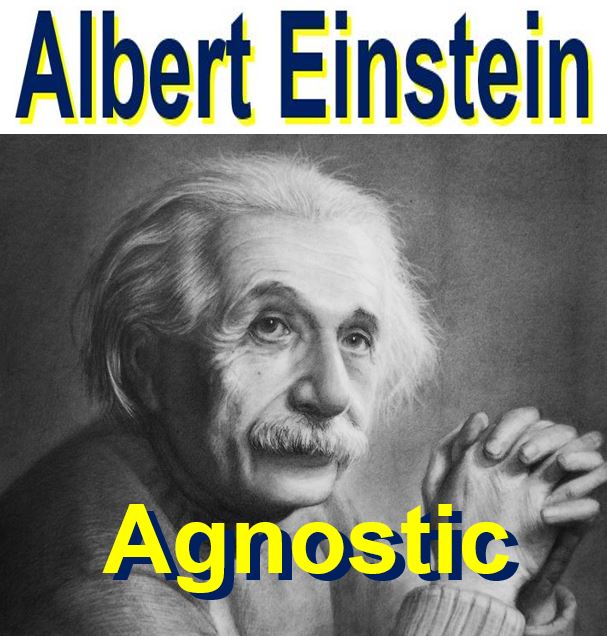Belief in God occurs when we suppress the analytical part of our brain and engage the empathic network, but when we focus on the physical world we use the brain network used for analytical thinking, a team of researchers found. They also pointed out that nearly 90% of Nobel laureates in the 20th century were also religious – being both scientific and religious or spiritual is possible and very common.
Tony Jack, an associate professor of philosophy at Case Western Reserve, and colleagues explained in the journal PLoS ONE (citation below) that the conflict between religion and science probably has its origins in the structure of the human brain.
There have long been clashes between the use of scientific evidence versus faith to explain the world around us. Perhaps the most visible example of this clash today are the arguments between creationism and evolution.
 Albert Einstein used several labels to describe his religious views, including agnostic, pantheistic, and religious non-believer. He once said: “It seems to me that the idea of a personal God is an anthropological concept which I cannot take seriously. I feel also not able to imagine some will or goal outside the human sphere.” On another occasion, he said: “Science without religion is lame, religion without science is blind.”
Albert Einstein used several labels to describe his religious views, including agnostic, pantheistic, and religious non-believer. He once said: “It seems to me that the idea of a personal God is an anthropological concept which I cannot take seriously. I feel also not able to imagine some will or goal outside the human sphere.” On another occasion, he said: “Science without religion is lame, religion without science is blind.”
Analytical & empathic brain networks
To believe in a universal spirit or supernatural God, humans appear to suppress the brain network used for analytical thinking and boost the empathic network, the authors say. When we think analytically about the physical world, we appear to do the opposite.
Research leader, Prof. Jack, who is also research director of the university’s Inamori International Center of Ethics and Excellence, said:
“When there’s a question of faith, from the analytic point of view, it may seem absurd. But, from what we understand about the brain, the leap of faith to belief in the supernatural amounts to pushing aside the critical/analytical way of thinking to help us achieve greater social and emotional insight.”
 Joseph Priestley (1733–1804), an English non-trinitarianism clergyman and chemist who wrote the controversial work History of the Corruptions of Christianity. He is credited with discovering oxygen. He also invented soda water.
Joseph Priestley (1733–1804), an English non-trinitarianism clergyman and chemist who wrote the controversial work History of the Corruptions of Christianity. He is credited with discovering oxygen. He also invented soda water.
Richard Boyatzis, distinguished university professor and professor of organizational behavior at Case Western Reserve, said regarding religious versus scientific people:
“A stream of research in cognitive psychology has shown and claims that people who have faith (i.e., are religious or spiritual) are not as smart as others. They actually might claim they are less intelligent.”
“Our studies confirmed that statistical relationship, but at the same time showed that people with faith are more prosocial and empathic.”
Empathy – religious faith
After carrying out a series of eight experiments, Prof. Jack and colleagues found that the more empathic people are, the more likely they are religious.
The authors say that finding may offer a new explanation for past studies that showed that women are more religious or spiritual than men – women have a stronger tendency towards empathic concern than their male counterparts.
The team found that atheists are more closely aligned with psychopaths – not killers, but the vast majority of psychopaths diagnosed as such – because of their lack of empathy for others.
Apart from Professors Jack and Boyatzis, the other authors of this paper were Scott Taylor, assistant professor of organizational behavior at Babson College, and Jared Friedman, a research assistant and recent graduate in Philosophy and Cognitive Science.
 Stephen Hawking said in 2014: “Before we understand science, it is natural to believe that God created the universe. But now science offers a more convincing explanation.”
Stephen Hawking said in 2014: “Before we understand science, it is natural to believe that God created the universe. But now science offers a more convincing explanation.”
Structure of human brain
The study is based on the hypothesis that our brain has two opposing domains in constant tension.
In previous research, Prof. Jack’s Brain, Mind & Consciousness lab used fMRI (functional magnetic resonance imaging) to show that the human brain has an analytical network of neurons that enable us to think critically, as well as a social network which gives us empathy.
When we are faced with an ethical dilemma or physical problem, our brains (if they are healthy) fire up the appropriate network while suppressing the other.
Prof. Jack said:
“Because of the tension between networks, pushing aside a naturalistic world view enables you to delve deeper into the social/emotional side.”
“And that may be the key to why beliefs in the supernatural exist throughout the history of cultures. It appeals to an essentially non-material way of understanding the world and our place in it.”
Empathy and anti-scientific beliefs
Regarding empathy, Mr. Friedman said:
“Having empathy doesn’t mean you necessarily have anti-scientific beliefs. Instead, our results suggest that if we only emphasize analytic reasoning and scientific beliefs, as the New Atheist movement suggests, then we are compromising our ability to cultivate a different type of thinking, namely social/moral insight.”
“These findings,” Friedman continued, “are consistent with the philosophical view, espoused by [Immanuel] Kant, according to which there are two distinct types of truth: empirical and moral.”
 Baruch Aba Shalev wrote in his book ‘100 Years of Nobel Prizes’ that the vast majority of Nobel Prize winners from 1901 to 2000 believed in God. (Image: amazon.com)
Baruch Aba Shalev wrote in his book ‘100 Years of Nobel Prizes’ that the vast majority of Nobel Prize winners from 1901 to 2000 believed in God. (Image: amazon.com)
Eight different experiments
The researchers carried out eight different experiments, each involving between 159 and 527 adults. Their aim was to examine the relationship between belief in a universal spirit or God with measures of moral concern and analytical thinking.
They found that consistently through all the eight experiments, the more religious the person, the more moral concern they showed. However, they did not establish any cause and effect.
Empathic concern and prayer
The researchers found that both empathic concern and spiritual belief were positively associated with how often a person prayed, meditated or engaged in other religious or spiritual practices – but neither were predicted by church dinners or other social contact linked to religious affiliation.
Some researchers theorize that mentalizing – interpreting human behaviour in terms of intentional mental states such as purposes, needs or desires – has a positive association with belief. In this study the researchers found no such association.
 Max Planck (1858–1947) a German theoretical physicist whose work on quantum theory won him the Nobel Prize in Physics in 1918, once said: “It was not by accident that the greatest thinkers of all ages were deeply religious souls.”
Max Planck (1858–1947) a German theoretical physicist whose work on quantum theory won him the Nobel Prize in Physics in 1918, once said: “It was not by accident that the greatest thinkers of all ages were deeply religious souls.”
As in other studies, the eight experiments showed that analytical thinking discourages acceptance of religious or spiritual beliefs.
However, the statistical analysis of data gathered and analysed from all eight experiments suggests that empathy is more important for religious belief than analytic thinking is for disbelief.
Networks suppress each other
So, why can the conflict between religion and science become so strong?
Prof. Boyatzis said:
“Because the networks suppress each other, they may create two extremes. Recognizing that this is how the brain operates, maybe we can create more reason and balance in the national conversations involving science and religion.”
Using both analytic and empathic networks
We are built to engage and explore using both networks, the authors wrote.
Prof. Jack said:
“Far from always conflicting with science, under the right circumstances religious belief may positively promote scientific creativity and insight.”
“Many of history’s most famous scientists were spiritual or religious. Those noted individuals were intellectually sophisticated enough to see that there is no need for religion and science to come into conflict.”
 Richard Dawkins, an English ethologist, evolutionary biologist, and writer, once said: “The more you understand the significance of evolution, the more you are pushed away from the agnostic position and towards atheism. Complex, statistically improbable things are by their nature more difficult to explain than simple, statistically probable things.”
Richard Dawkins, an English ethologist, evolutionary biologist, and writer, once said: “The more you understand the significance of evolution, the more you are pushed away from the agnostic position and towards atheism. Complex, statistically improbable things are by their nature more difficult to explain than simple, statistically probable things.”
The authors refer to the book 100 Years of Nobel Prizes, written by Baruch Aba Shalev, which found that of the 654 Nobel laureates from 1901 to 2000, almost 90% belonged to one of twenty-eight religions. The remaining 10.5% were either freethinkers, agnostics or atheists.
It is possible to be religious and a very good scientist, Prof. Jack explained. In fact, religious eminent scientists are the norm.
The authors agree with the New Atheists that suspension of analytical thinking – at the wrong moment – can be dangerous, and point to how religious differences have led to wars and persecutions throughout history.
Prof. Jack said:
“Although it is simply a distortion of history to pin all conflict on religion. Non-religious political movements, such as fascism and communism, and quasi-scientific movements, such as eugenics, have also done great harm.”
Prof. Jack and colleagues suggest, however, that taking a carefully considered leap of religious faith appears to be an effective route for boosting emotional insight.
This study, like previous ones, found that overall, religious belief is linked to greater compassion, more social inclusiveness, and greater motivation to engage in pro-social actions.
Rules to avoid conflict
According to Prof. Jack, conflict can be avoided if we remember simple rules:
“Religion has no place telling us about the physical structure of the world; that’s the business of science. Science should inform our ethical reasoning, but it cannot determine what is ethical or tell us how we should construct meaning and purpose in our lives.”
The researchers plan to find out whether people who increase their empathy then become more spiritual or religious, or whether it is the other way round.
In an Abstract in the journal, the authors wrote:
“These findings challenge the theoretical view that religious and spiritual beliefs are linked to the perception of agency, and suggest that gender differences in religious belief can be explained by differences in moral concern.”
“These findings are consistent with the opposing domains hypothesis, according to which brain areas associated with moral concern and analytic thinking are in tension.”
Citation: “Why Do You Believe in God? Relationships between Religious Belief, Analytic Thinking, Mentalizing and Moral Concern,” Anthony Ian Jack, Richard Eleftherios Boyatzis, Jared Parker Friedman and Scott Nolan Taylor. PLoS ONE 11(3): e0149989. 23 March 2016. DOI: 10.1371/journal.pone.0149989.
Brain fog
People suffering different levels of ‘brain fog‘ may find that their interpretation of science and religion fluctuates.
A person is suffering from brain fog if their memory is weaker and they are mentally tired.
According to Cognitune Smarter Health: “We’ve all experienced brain fog and mental cloudiness at some point in our busy lives.”
“Unwanted mental fatigue can hit you in the morning, afternoon, or evening – brain fog doesn’t discriminate on the time or place.”
Video – Science vs. Religion
In this Keele University video, Tom McLeish is joined by Coel Hellier, Professor of Astrophysics at Keele University. These eminent physicists, one a Christian, the other an atheist, launch a conversation where faith meets science.

Comments are closed.